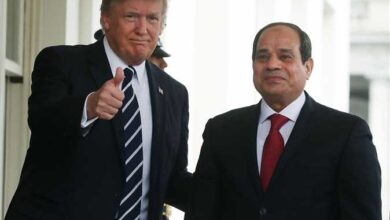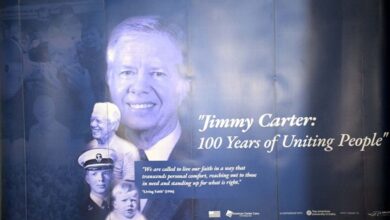In an editorial on Friday, the Washington Post condemned Secretary of State Hillary Clinton for saying “nothing” to Egypt’s Foreign Minister Ahmed Abul Gheit about what the paper described as unfair and illegitimate power sharing in the country.
The editorial is one in a series of articles recently published by the Washington Post relaying senior US congressional concerns over recent political developments in Egypt and the crackdown on opposition and media ahead of the forthcoming parliamentary poll.
According to the Post, Clinton, who met with Abul Gheit in Washington on Wednesday, “might have been expected to press him about the repression.”
“About the Egyptian government – which, to say the least, does not share power fairly and legitimately – Ms. Clinton said nothing; not one word. To judge from her statement, the subject never came up,” the Post wrote.
Instead, the meeting focused on Iraq’s new government, peace talks between Israelis and Palestinians and Sudan’s referendum.
The paper went on to quote State Department spokesman P.J. Crowley, who assured that the Wednesday’s meeting touched on Egyptian issues, where there was “a meaningful and spirited discussion. They understand fully the importance we attach to human rights and civil society in Egypt."
“That’s good to hear…,” the Post wrote in response. However, it continued, “Egypt's upcoming election will not be free or fair no matter the US role. But what the Obama administration says about it, in public, means a lot to the hundreds of thousands of brave Egyptians who have joined pro-democracy movements – and to those who quietly wait for the political transition that everyone in Cairo knows will come when the ailing president steps down or dies.”
“Ms. Clinton had an opportunity to send a vital message; wrongly, she chose not to,” it said at the end.
The most-widely read Washington DC news publication and the closest to the city’s policy makers has been directing staunch criticism to the state of freedoms in Egypt ahead of the next parliamentary poll.
In a 29 October editorial, the Post wrote that President Hosni Mubarak’s actions to date appear to be "exactly the opposite of what the president [Obama] asked."
Some attributed the Post’s editorial line to the firm belief of some of its journalists, especially in the editorial page department, in the question of democracy in Egypt.
“The editorial policy has been there. It’s difficult to see the Post change so long as Mubarak is in the regime,” Hisham Kassem, publisher and observer on Egyptian American issues told Al-Masry Al-Youm.
This wave of criticism is perceived as a subtle transition of Obama’s adopted rapprochement to the Egyptian regime, which has been condemned of coming to the detriment of relative freedoms by the opposition and the media.
According to Kassem, such writings eventually pose pressure. “Hilary and Obama still have some hope in the peace process. That’s why [Egypt’s Chief of Intelligence] Omar Suleiman and Abul Gheit went to the US with some suggestions.”
For him, Obama’s hope in the peace talks have protected Egypt from pressure on domestic reform. “But when the peace process fails, or violence erupts, expect pressure [on Egyptian domestic reforms] to resume.”
I




